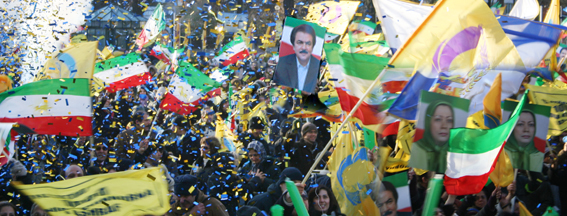Summary
On November 30, Britain’s Proscribed Organisations Appeal Commission (POAC), a specialist Court formed to hear challenges to Britain’s terrorist list, ordered the British government to remove the People’s Mujahedeen Organization of Iran (PMOI), also referred to as the Mujahedin-e Khalq (MEK) from its list of terrorist organizations. MEK is Iran’s main political opposition organization and a member of the National Council of Resistance of Iran (NCRI), an umbrella coalition of Iranian opposition groups. Click here for POAC’s ruling.
Having ruled that Britain’s Secretary of State got the law wrong and failed to take relevant facts into account, POAC added, in an almost unprecedented statement, “…having carefully considered all the material before us, we have concluded that the decision [of the Secretary of State]…is properly characterized as perverse…We recognize that a finding of perversity is uncommon. We believe, however, that this Commission is in the (perhaps unusual) position of having before it all of the material that is relevant to the decision.”
A Look Back
| March 2001 | Under the Terrorism Act 2000, the Secretary of State sought to proscribe 21 organizations, one of which was the PMOI (known as “the Mujaheddin-e-Khalq” or MeK). The Order came into force onMarch 29, 2001. |
| June 2006 | Thirty five Applicants, being sixteen members of the House of Commons and nineteen members of the Britain’s Upper House (the House of Lords), including a former Home Secretary, Lord Waddington, former Solicitor General, Lord Archer, and a retired Law Lord, Lord Slynn, apply to the Secretary of State to de-proscribe the PMOI. The Applicants maintain that the continued proscription of the PMOI puts constraints on their otherwise right to support the PMOI by all available democratic and lawful means. They say that they wish to, and considered that they are entitled to, invite support for the PMOI, arrange meetings to further the political activities of the PMOI, address meetings to encourage support for the PMOI and invite others to provide money and property to further the political activities of the PMOI. |
| Sept. 2006 | The Secretary of State rejects the de-proscription application, despite failing to produce any evidence of PMOI being “concerned in terrorism”. |
| October2006 | The thirty five Parliamentarians appeal the refusal. The essential thrust of the Appeal is that the Secretary of State had failed to produce a shred of evidence proving the PMOI “is concerned in terrorism”. The Parliamentarians argued, whatever the nature of the organization’s activities at the time of proscription, since 2001 the PMOI and its members have ceased military activity and in 2003 the PMOI’s personnel inIraqvoluntarily handed over their arms to Coalition forces. |
| 23-31 July 2007 | Proscribed Organisations Appeal Commission (POAC) holds hearings to hear the arguments, while scrutinizing more than 20 witness statements and 20 volumes of documentation. Three days of “closed hearing” took place in which all “classified material” from a variety of sources was scrutinized. In this part of the hearing a British Foreign Office official gave oral testimony and was cross-examined about the “classified material”. |
| Nov. 30, 2007 | Rejecting the documentation produced by the British government, including the “classified material”, and rejecting the oral testimony of the British Foreign Office official, POAC rules that “having carefully considered all the material before us, we have concluded that the decision” to keep the PMOI blacklisted “was flawed and must be set aside”. It added that the decision “is properly characterised as perverse”. The POAC added that “we order that Secretary of State lay before Parliament the draft of an Order under section 3(3)(b) of the 2000 Act removing the PMOI from the list of proscribed organisations in Schedule 2.” |
| Dec. 14. 2007 | POAC reaffirmed its November 30 ruling and rejected the Secretary of State’s leave for appeal against the judgment. |
POAC’s introduction to the PMOI
“The PMOI is an Iranian political organisation and a member of the National Council of Resistance of Iran (NCRI) (which is not proscribed in theUK). It was founded in 1965. The purpose was initially to oppose the regime of the Shah. Its present stated purpose is, and has been for some years, the replacement of the existing theocracy with a democratically elected, secular government inIran.”
“It took an active part in the protest withinIranthat ultimately led to the downfall of the Shah in 1979. Thereafter, it speedily came into conflict with the succeeding fundamentalist regime of the Ayatollah Khomeini. The PMOI contend that there followed for several years withinIrana sustained regime of oppression, violence, and killings orchestrated by the clerical rulers of the country.”
“Towards the end of 1981, many of the members of the PMOI and supporters went into exile. Their principal refuge was inFrance. But in 1986, after negotiations between the French and the Iranian authorities, the French government effectively treated them as undesirable aliens, and the leadership of the PMOI with several thousand followers relocated toIraq.”
“Since the proscription in 2001 and occupation of Iraq in 2003 the PMOI have continually pursued a campaign to legitimize their status as a secular, democratic movement intent upon the peaceful overthrow of the present undemocratic regime in Iran, to which end they seek to enlist support at the highest level in the United Kingdom (and elsewhere) for the promotion of that object. The organization has engaged the sympathy of a number of members of both Houses of Parliament. The present Appellants are thirty five in number (one since deceased), being sixteen members of the House of Commons and nineteen members of the Upper House. Included in the latter group are one former Lord of Appeal in Ordinary and five QCs.”
